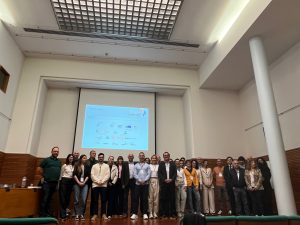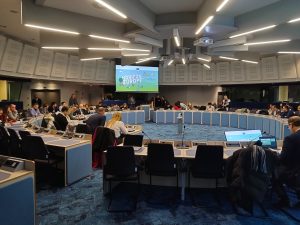Nowadays, 7,5 millions of European young people between 15 and 24 aren’t currently engaged in Employment, Education or Training (NEETs). The possibility of a ‘lost generation’ urges EU institutions and governments, businesses and social partners at all levels to address the youth unemployment challenge. GOJOBGO comes to contribute to youth employment, namely of the youngsters that have been involved in mobility schemes and face difficulties both in finding a job and in exploiting the added value of mobility experiences on their professional profiles.
GOJOBGO project is developed by a European Partnership composed of 9 members from 7 European countries, and is co financed by Erasmus+ Programme, Action KA2, under the code 2014-1-ES01-KA202-004998. GOJOBGO will last until 30/06/2016.
GOJOBGO aims to:
- Reinforce the links between skilled job seekers with mobility experiences and employers and labour market.
- Support the employability of job seekers with and International background.
- Contribute to the visibility of European reference tools for the recognition, validation and transparency of competences and qualifications.
- Develop best practices in the support for employability in the post-mobility period of Erasmus+ Programmes for Professional Training and Superior Education.
To achieve such aims, GOJOBGO has four objectives:
- Promoting the use of Information and communications technology (ICT) and Open Educational Resources (OER) for employability purposes.
- Promoting structured inter-regional cooperation: enhancing the commitment of local and regional pubic authorities in the qualitative development of the education, training and youth fields.
- Increasing participation in learning and employability by providing a rich variety of European and national support tools and resources.
- Facilitating the transition of learners through different levels and types of formal/non-formal education and training through the use of European reference tools for the recognition, validation and transparency of competencies and qualifications.
With this purpose, two fundamental GOJOBGO tools will be developed:
- GOJOBGO PORTAL – Where job seekers can insert their CVs and highlight skills and competences acquired in the frame of transnational mobility and where potential employers can easily seek future employees with specific skills and international experiences in their background
- IMPROVE MY PROFILE – Integrated in the Portal, there will be a set of tools, tips and instruments used worldwide level to improve profiles. Job seekers can/should go over all the steps in order to make sure their job search rends visible all the skills acquired in Mobility. The main issues approached will be CV, job search, applications and national/European labour market.
- PILOT TEST TO GOJOBGO – in order for job seekers and employers to test, get familiar and give feedback with both Portal and
- “IMPROVE MY PROFILE” toolkit and be totally able to exploit its benefits.
The expected results to be reached are:
- Greater support to mobility participants after their international experience.
- Increased employability of young skilled people after an international experience.
- Enhanced use of European certification tools in order to foster the employability.
- Wider recognition of competences connected, in accordance with the ECVET system, both on professional level, as well as on personal and social level, both for professional and for citizen participation.
- Active involvement of public bodies in charge of Education, Training and Employment in the support of target groups in their transition to the labour market
- Adhesion to the Resources and Portal by job seekers and employers from Europe.
- Capitalization of the value of the international mobility experiences as a tool for learning and personal and professional development.
- Improved tutoring and mentoring practices and tools of the mobility experiences, considering them learning processes that have to be linked with participants learning paths and personal and professional objectives.
- Greater involvement of employers in mobility issues, allowing them to benefit from European mobility programmes by an active recruitment of young skilled people.


